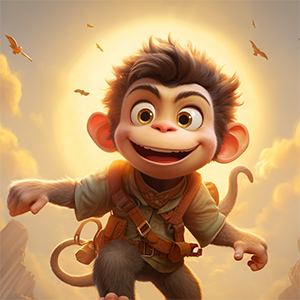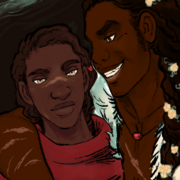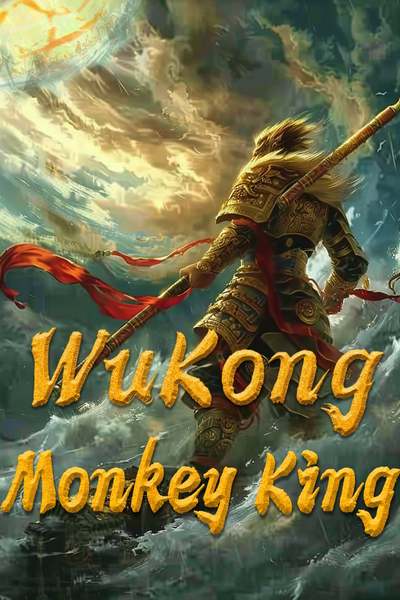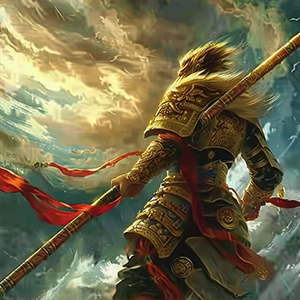The Stone Monkey found itself on a bridge, its soul still trembling from the fall. Was this the Iron Bridge or the Bridge of Helplessness?
The sound of rushing water behind it confirmed its survival in this world of the Journey to the West.
Spanning thirty feet, each step the Stone Monkey took on the bridge was a profound shock to its spirit.
The Way!(Tao,from the "Tao Te Ching")
Whose ‘The Way’?
Each word etched deeply into the Stone Monkey's heart.
"The Way that can be told is not the eternal Way. The name that can be named is not the eternal name. The nameless is the beginning of heaven and earth. The named is the mother of the ten thousand things...."
"Heaven and earth are not benevolent, treating all things as straw dogs; the sage is not benevolent, treating the people as straw dogs..."
"The shape of shapelessness, the image of nothingness..."
Having read some classics in its past life, the Stone Monkey recognized these verses as from Laozi's Tao Te Ching. Laozi, the Supreme Old Lord, the Celestial Venerable of Morality! How could his teachings appear here?
Clouded in doubt, the Stone Monkey listened as the Tao Te Ching was recited in full, feeling as though something had been added to its soul.
A feeling indescribable in words, soothing and intensely comfortable.
This feeling, what is it again?
Immediately, a voice provided him with the answer: "Chapter 81 of the Tao Te Ching, adding three thousand instances of Fate, materials that can be shaped, rare, rare, haha..."
This feeling, is it Fate? The Stone Monkey recalled the text of "Journey to the West," where the term "Fate" appeared frequently, suggesting it likely wasn't a bad thing.
The voice had not yet finished, and there was more!
Who's Dao is it this time?
"Thus have I heard. At one time, the Buddha was in the country of Shravasti, in the Jeta Grove, in the garden of Anathapindika. At that time, the World-Honored One, together with a gathering of monks, was staying in the bamboo grove. These monks..."
"Today, seeing the guide of the world, has opened my wisdom eye. To speak of the pure Dharma, to depart from all attachments. Today, encountering a divine being, has allowed me to achieve the unborn. I wish in the future to attain enlightenment, just like the honored bipeds..."
The Stone Monkey found this lengthy Buddhist scripture bewildering, as he had never read such profound Buddhist texts before. However, after hearing each section, he would silently chant "Amitabha Buddha" in his heart.
Listening on, the Stone Monkey gradually became touched by the scripture and began to understand its meaning. It turned out that this scripture was actually an autobiography of the Buddha, detailing many of the Buddha's past and present deeds.
After listening for a long time, the Stone Monkey had an epiphany. He compared his past life's experiences with those of the Buddha, reminding him of the saying: a person cannot lose what they have never had—how could anyone take away what was never theirs to begin with?
To the Stone Monkey, the world of "Journey to the West," seen in his previous life as fictional, now seemed more real and tangible than the world of his past life, which had become a distant memory. Compared to the two worlds, the current one seemed more genuine to him.
His previous life felt like a dream, aside from the useful memories, what else did he need?
Thinking so, the Stone Monkey's mood suddenly brightened.
A person might fall in love with a bird in flight, but the next moment, you can no longer see it. To this person, the bird's significance exists only in the spirit.
This scripture was transmitted for two hours, and the Stone Monkey discovered, to his surprise, that he had not taken a single step during this time. The water under the bridge seemed to freeze, yet it flowed very slowly.
This was a strong sensation of time disarray, with dozens of moments in a single thought, and nine hundred cycles of birth and death in a moment. Which is faster, which is slower? Fast and slow, life and death, exist only in the mind.
Finally, when the scripture ended, the Stone Monkey felt a clear and bright sensation in his head. The past, present, future...
"You should know. The seeds sown in the past, through countless eons, never erode. In my past..."
"Four volumes of the 'Past and Present Causes and Effects Sutra,' adding six thousand instances of Fate, not bad, not bad."
Hearing this voice, there seemed to be a tone of approval for the Stone Monkey.
The Stone Monkey felt as if he was trapped in a puzzle, eager to carve out time to sort through the perplexing doubts in his mind, but the voice continued uninterrupted, leaving him no chance to be distracted.
Then came another Dao!
Whose Dao was this time?
"In the Northern Darkness, there is a fish named Kun. The Kun is so large, I do not know how many thousand li it measures. It transforms into a bird, named Peng. The back of the Peng, I do not know how many thousand li it spans; it flies in anger..."
"The Free and Easy Wandering!"
"The Free and Easy Wandering" was widely known in the Stone Monkey's previous life, and he liked it very much. Although he could not recite it entirely, he deeply understood Zhuangzi's longing for freedom.
A spirit of ninety thousand li fluttering above the three thousand rivers of Puyang. The heart of a newborn returns to nature, ultimately becoming the Classic of Southern Flowers. Dragging its tail in the mud, freely wandering through the mortal world...
In the illusion-like Water Curtain Cave, with the sound of rushing waterfalls behind and the dreamlike immortal cave dwelling before him, and the melodious sounds of "The Free and Easy Wandering" in his ears, the Stone Monkey's heart seemed to take flight. He had read "The Free and Easy Wandering" countless times in his previous life but never felt this way before.
After thirty-three chapters of "The Free and Easy Wandering," the Stone Monkey had just crossed a thirty-foot-long iron bridge. Standing at the bridgehead, the Stone Monkey lingered in the aftertaste of "The Free and Easy Wandering," unmoving for a long time.
The voice was silent for a while before finally sighing and saying: "One volume of 'The Free and Easy Wandering,' producing nine thousand instances of Fate, your talents are boundless, fortune or misfortune? Take care of yourself."
The Stone Monkey's thoughts were soaring through the heavens, suddenly called back by this voice, and he immediately asked: "Who are you?"
The Water Curtain Cave, spanning a thousand zhang in every direction, was empty. Where could anyone be?
The Stone Monkey walked into the cave, just as he expected, and saw a stone stele standing in the cave, inscribed with the words "Mount Huaguo, a land of blessings, the Water Curtain Cave, a heavenly place."
Inside the cave, tables, chairs, bowls, and utensils were all made of stone, fully equipped for living.
At this moment, the Stone Monkey remembered something. He didn't know how long he had been in the cave, and wondered if the group of monkeys outside had left.
He immediately went out of the cave, leaping out to appear atop a cliff.
The monkeys were still there, and they were shocked to see the Stone Monkey leap out from the water.
The Stone Monkey thought it best to follow the script, so he shouted: "Great Fate! Great Fate!" Indeed, the monkeys surrounded him, asking, "What's it like inside? How deep is the water?"
"There's no water! No water at all! It's actually an iron bridge leading to a naturally formed home," the Stone Monkey explained. The monkeys were curious, "How can it be a home?" The Stone Monkey replied with a smile, "The stream flows under the bridge, creating a curtain that conceals the entrance. Beside the bridge, there are flowers and trees, leading to a stone house filled with stone nests, stoves, bowls, basins, beds, and stools. At the center, a stone stele reads ‘Mount Huaguo, a blessed land; Water Curtain Cave, a heavenly abode.’ It's truly a place for us to settle. The inside is spacious enough to accommodate hundreds of us, sparing us from the elements..."
The monkeys, overjoyed, insisted, "You go in first! You go in first!"
Re-entering the Water Curtain Cave, the Stone Monkey was followed by several bold monkeys. In less than half an hour, over a thousand monkeys had entered without feeling crowded.
Inside, the monkeys, fascinated by the myriad of interesting things, created a ruckus.
Taking his seat on a central stone chair, the Stone Monkey commanded silence. The monkeys ceased their activity, all ears.
"Do you remember our agreement? Whoever finds the source of the stream shall be our king. Not only did I find the source, but I also found us this heavenly abode, freeing our kind from the hardships of weather. Why not acknowledge me as king?"
Hearing this, all monkeys bowed down, including the four elders. Witnessing the Stone Monkey miraculously flying up into the waterfall earlier, combined with its origin from the mystical stone, the monkeys revered it even more.
With the monkeys' allegiance secured, the Stone Monkey felt a major accomplishment. It organized the monkeys into four groups, each led by an elder, to gather food and water, decorate the cave, and make it vibrant.
After settling the monkeys, the Stone Monkey retreated to a stone chamber to ponder the mysteries of the Water Curtain Cave. The presence of objects and inscriptions indicated it was not naturally formed. Discovering unextinguished ashes in the stove suggested previous inhabitants, hinting at a deeper significance.
The Water Curtain Cave, not just a natural refuge but a previous dwelling, was seemingly bestowed upon the Stone Monkey as a grand gift. The cave's previous occupant and the voice that imparted teachings could very well be the same entity. Who could this be, and was the cave specifically prepared for the Stone Monkey?
Receiving teachings and the cave indicated great fortune, but the Stone Monkey understood the Water Curtain Cave was foundational for the Great Sage Equal to Heaven, who would eventually challenge the celestial heavens.
Coming from the modern world, the Stone Monkey knew nothing was free. The glory of the Monkey King came with its share of trials, including centuries of imprisonment and a journey fraught with restrictions and ulterior motives.
All these stemmed from the upheaval in the heavenly palace, with the Water Curtain Cave playing a crucial role. Without it, the Stone Monkey's rise to power, the quest for immortality, and the eventual confrontations with celestial authorities would not have happened.
Reflecting on its journey from the modern world to embodying Sun Wukong, the Stone Monkey felt profoundly fortunate. In a month, it fully embraced its new identity, casting off its past life's constraints, embodying the spirit of boundless freedom.
The Water Curtain Cave was merely the beginning of the Journey to the West's vast narrative, igniting the Stone Monkey's curiosity and setting the stage for its forthcoming adventures.
Even in dreams, the Stone Monkey lingered on thoughts of the Water Curtain Cave and the mysterious teacher, hinting at the deep impact of these early experiences on its journey ahead.
Annotations:
Tao Te Ching(道德经): A fundamental text for both philosophical and religious Taoism, attributed to Laozi. It emphasizes living in harmony with the Tao, which is the fundamental nature of the universe.
The Way (Tao,道): At the heart of Taoist philosophy, the Tao is an undefinable force that underlies and unites everything in the universe. It's the ultimate source and the principle of order. The text emphasizes that the true essence of the Tao cannot be fully captured through language or naming, pointing to the limitations of human understanding and the concept's profound mysticism.
Fate (造化,ZaoHua): A term often used in Chinese literature to describe the combination of natural talent, destiny, and the opportunities that life presents. It embodies the nuanced belief in how external forces and internal qualities interact to shape one's life.
Straw Dogs: In ancient Chinese rituals, straw dogs were used as offerings to gods and ancestors but were discarded after the ceremonies. The use of "straw dogs" in the text symbolizes the Taoist view of the universe's impersonal nature—everything is treated equally and without inherent value judgments, illustrating the concept of natural impartiality.
The Named and the Nameless: This dichotomy reflects the Taoist view of existence and non-existence, form and void. The "nameless" represents the unmanifested, eternal aspect of the Tao, the origin of all things. The "named" refers to the manifested world, where the infinite possibilities of the Tao take physical form. This distinction underlines the belief in the coexistence and mutual dependence of opposites in the universe (a concept known as "yin and yang").
The Shape without Shape and the Image without Object: These phrases point to the ineffable nature of the Tao, which exists beyond physical forms and sensory perceptions. They challenge readers to understand the Tao not as an entity with qualities or characteristics but as the underlying principle of all existence, transcending conventional notions of being and non-being.
Buddhist Scriptures: Teachings attributed to the Buddha, focusing on the nature of mind, suffering, and the path to enlightenment.
Free and Easy Wandering (逍遥游): A chapter from Zhuangzi, one of the foundational texts of Taoism, expressing ideals of freedom from worldly constraints and living in harmony with the natural world.
Iron Bridge and Bridge of Helplessness: Metaphorical references to crossing from life to death or traversing difficult paths in life. In Chinese mythology, the Bridge of Helplessness (奈何桥) is crossed by souls heading to the afterlife.
Water Curtain Cave: The legendary home of Sun Wukong, the Monkey King, in Journey to the West. Located in Mount Huaguo, it represents a paradisiacal and self-sufficient hideaway.
Past, Present, Future: Concepts reflecting Buddhist and Taoist beliefs in the impermanence of existence and the continuous flow of time and.











Comments (0)
See all